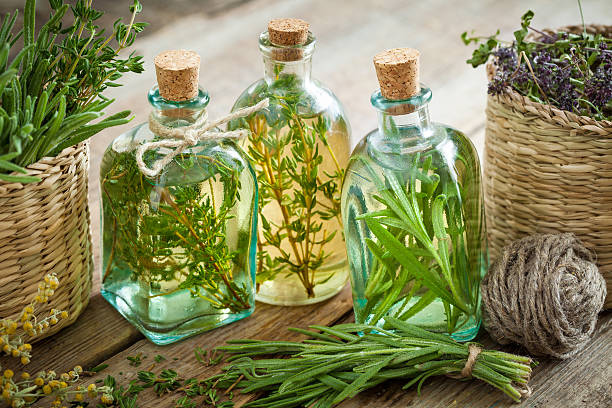
What are Infused Olive Oils, and How Do You Use Them?
Share
In the world of gourmet cooking, olive oil has long held a place of prestige. But among the many varieties, infused olive oil stands out as a creative and flavorful way to elevate dishes. For culinary enthusiasts, understanding what is infused olive oil and how to best use it can unlock a world of recipe possibilities, aroma profiles, and food pairings.
This comprehensive guide will explore infused oils, how they differ from other flavored oils like fused olive oils, their applications in cooking, and how they enhance both taste and nutrition. We'll also walk through some versatile recipe ideas and pairing strategies using herbs, garlic, and more.
What Is Infused Olive Oil?
Infused olive oil is olive oil that has been enhanced with the flavors of herbs, spices, fruits, vegetables, or even edible flowers. The infusion process typically involves steeping flavoring agents into finished, high-quality extra virgin olive oil to extract their aromatic compounds and taste.
This differs from fused olive oils, where the fresh ingredients (like citrus or herbs) are crushed together with the olives during the cold-pressing process. Both types deliver strong, concentrated flavors but with different preparation methods and taste results.
You can browse a diverse variety of expertly crafted fused and infused olive oils available online from artisan producers.
Types of Infused Olive Oils
Infused olive oils come in a wide array of flavor profiles, which can range from savory and herbaceous to fruity or spicy. Common infusions include:
- Garlic Olive Oil: Rich, pungent, and savory.
- Rosemary or Basil Olive Oil: Earthy and herbaceous.
- Chili-Infused Olive Oil: Spicy with a warm kick.
- Citrus-Infused Olive Oil: Bright and zesty with lemon or orange.
- Truffle-Infused Olive Oil: Deep, luxurious umami flavor.
Each oil type lends itself to different culinary uses, and learning to pair them well enhances both everyday cooking and gourmet experimentation.
Flavored Olive Oil Uses: How to Enhance Your Cooking
The beauty of flavored olive oil lies in its versatility. Whether used for cooking, finishing, or even dipping, infused oils bring new dimensions of flavor without requiring complex ingredients.
Here are some common and creative flavored olive oil uses:
Finishing Dishes
A light drizzle of garlic or chili-infused olive oil over grilled vegetables, pasta, or soups can add a complex flavor layer right before serving.
Marinades & Dressings
Infused oils make a flavorful base for meat or vegetable marinades. Basil or oregano-infused olive oil works beautifully in vinaigrettes for Mediterranean salads.
Bread Dipping & Cheese Boards
Pairing herb-infused olive oil with crusty bread or charcuterie adds gourmet appeal to any appetizer spread.
Roasting & Grilling
Use rosemary or garlic oil when roasting potatoes or grilling meats. It enhances browning and contributes an aromatic, seasoned finish.
Pasta & Risotto
Swirl citrus or truffle-infused oil into risotto, or toss spaghetti with chili oil, garlic, and parmesan for a simple, flavorful dish.
Health Benefits: Garlic Olive Oil and Beyond
Infused oils don’t just deliver taste—they can also offer wellness benefits, depending on the infused ingredients and the base oil used.
Garlic olive oil, for instance, is known for more than its sharp, comforting flavor. Garlic contains allicin, a compound with antimicrobial and heart health properties. When infused into olive oil, the combination becomes a powerful, flavorful enhancer with added health benefits.
Other infused oils may provide the antioxidants and anti-inflammatory compounds found in herbs like oregano, thyme, and basil. The key is to use high-quality, cold-pressed extra virgin olive oil as the base to retain the oil's natural polyphenols and omega-9 fatty acids.
How to Use Infused Olive Oil in Recipes
When it comes to infused oil recipes, the applications are practically limitless. Whether you're preparing appetizers, mains, or even desserts, there’s always a way to incorporate a complementary flavored oil.
Here are a few inspired ideas to get started:
1. Garlic Olive Oil Pasta
Toss freshly cooked spaghetti with garlic olive oil, crushed red pepper, and a touch of parmesan for a classic Aglio e Olio.
Add chopped parsley and lemon zest for freshness.
2. Herb Olive Oil Grilled Chicken
Use a rosemary or thyme-infused oil as a marinade base.
Grill or bake the chicken and serve with roasted vegetables.
3. Citrus Olive Oil Cake
Use lemon-infused olive oil in place of butter in a cake recipe.
The citrus notes lift the flavor and add moisture naturally.
4. Spicy Shrimp Stir Fry
Sauté shrimp in chili-infused oil with garlic and ginger.
Finish with soy sauce and a splash of rice vinegar.
5. Caprese Salad with Basil Oil
Drizzle basil-infused olive oil over tomatoes, mozzarella, and fresh basil leaves.
Finish with a pinch of sea salt and balsamic glaze.
If you're new to cooking with these oils, start with small amounts and build the flavor gradually. Infused oils can be potent and are often best added after cooking, rather than during high-heat methods.
Herb Olive Oil Pairing Tips
Choosing the right herb olive oil for your dish can take your meal from average to exceptional. Here's a simple guide to effective herb olive oil pairing:
|
Herb Infused Oil |
Pairs Best With |
|
Basil Olive Oil |
Mozzarella, tomatoes, pasta |
|
Rosemary Olive Oil |
Lamb, potatoes, bread |
|
Thyme Olive Oil |
Chicken, mushrooms, lentils |
|
Oregano Olive Oil |
Pizza, grilled vegetables |
|
Dill Olive Oil |
Fish, cucumber, yogurt-based dishes |
As with wine or cheese, balance is key. Bold herbs complement rich proteins, while lighter, brighter herbs go well with vegetables and seafood.
Fused vs Infused Oils: What’s the Difference?
While both infused and fused oils deliver exciting flavors, they are not created the same way:
|
Fused Oil |
Infused Oil |
|
Ingredients are crushed with olives before pressing |
Ingredients are added to oil after pressing |
|
Typically fruit-based like lemon, orange, or chili |
Often herb or spice-based |
|
Stronger and more uniform flavor integration |
More delicate and nuanced flavors |
|
Higher freshness requirement |
Longer shelf life with proper storage |
Understanding this difference helps in choosing the right oil for your desired culinary effect. If you're looking to explore both, Olive Lane Oils offers a beautiful collection of fused and infused olive oils that showcase premium quality and balanced flavor profiles.
Storage Tips for Infused Olive Oils
To maintain the quality and safety of infused olive oils, proper storage is essential. Follow these best practices:
- Store in a cool, dark place – Avoid sunlight and heat sources.
- Use within 3–6 months – Especially for homemade infusions.
- Check for cloudiness or off smells – These are signs of spoilage.
- Use dark glass bottles – Helps protect the oil from light degradation.
If you’re purchasing infused oils from a trusted supplier, such as a specialty shop or online boutique, the oils are usually processed with sterilization and safe packaging methods, extending shelf life.
Ready to Explore More?
Whether you're a home chef or a food lover seeking new culinary adventures, infused olive oils provide an exciting way to experiment with taste and texture. From bold garlic notes to delicate basil aromas, these oils can transform simple meals into gourmet creations.
For personalized recommendations or to learn more about specific pairings, feel free to contact Olive Lane Oils for expert assistance.
Conclusion
Now that you understand what is infused olive oil, you can start experimenting with it in your kitchen. From enhancing salads to crafting flavorful marinades, these oils are a flavorful, aromatic upgrade to standard olive oils. Just remember: a little goes a long way, and quality always matters.
Whether you're pairing with grilled vegetables, making a citrus cake, or topping a fresh pizza, infused olive oils are an indispensable addition to any culinary toolbox.
FAQs:
Q1: Can I make infused olive oil at home?
Yes, but safety is crucial. Use dry ingredients (not fresh garlic or herbs) unless you're refrigerating and consuming quickly. Improper home infusion can lead to bacterial growth, such as botulism.
Q2: What is infused olive oil best used for?
It’s ideal for finishing dishes, dressings, marinades, and dips. Garlic, basil, or chili-infused oils are especially good for pasta and grilled dishes.
Q3: Does infused olive oil go bad?
Yes. Even store-bought oils should be used within their best-by date. Once opened, aim to use within a few months for optimal flavor.
Q4: Are there any nutritional benefits?
Yes. Garlic olive oil and herb-infused oils may contain compounds like antioxidants, depending on how they are prepared and stored.
Q5: Where can I find high-quality infused oils?
You can explore handcrafted selections from artisan producers such as Olive Lane Oils who offer both fused and infused varieties.
